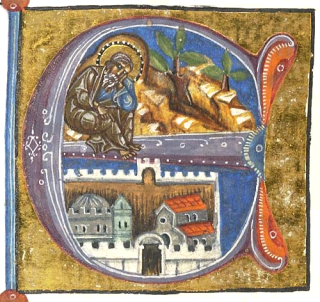
One long-standing religious tradition for Holy Week was that of the Tenebrae services, held on the last three days of Holy Week, representing the darkness (the literal meaning of the word) of Christ’s suffering and death. They featured reading of three lessons from the Lamentations of Jeremiah the Prophet, a Biblical account of the destruction of Jerusalem by Nebuchadnezzar and the exile of its people to Babylon. This lead to a many gorgeous musical settings of the Lamentations by several of the greatest composers of the Renaissance, one of which, a five-part setting by Orlande de Lassus, serves as the backbone of this programme.
The Lamentations convey the trauma caused by the collective loss of the Jewish people – the destruction of their beloved city, the suffering of innocents, the loss of their ways of life, their feeling of abandonment by God, whose wrath brought about all this calamity – but also a sliver of hope that God will have mercy on them and forgive their sins. For this occasion, we interwove them with accounts of deep personal loss: the death of his father by Dietrich Buxtehude, and the death of their patron and an outstanding political figure of the time Lorenzo il Magnifico by poet Angelo Poliziano and composer Heinrich Isaac … but ended with a sliver of hope.
Programme list
Programme notes and translations
Lamentations of Jeremiah the Prophet, for Good Friday
8 Heth. The Lord hath purposed to destroy the wall of the daughter of Sion: he hath stretched out his line, and hath not withdrawn his hand from destroying: and the bulwark hath mourned, and the wall hath been destroyed together. 9 Teth. Her gates are sunk into the ground: he hath destroyed, and broken her bars: her king and her princes are among the Gentiles: the law is no more, and her prophets have found no vision from the Lord. 10 Jod. The ancients of the daughter of Sion sit upon the ground, they have held their peace: they have sprinkled their heads with dust, they are girded with hair-cloth, the virgins of Jerusalem hang down their heads to the ground.
13 Mem. To what shall I compare thee? or to what shall I liken thee, O daughter of Jerusalem? to what shall I equal thee, that I may comfort thee, O virgin daughter of Sion? for great as the sea is thy destruction: who shall heal thee? 14 Nun. Thy prophets have seen false and foolish things for thee: and they have not laid open thy iniquity, to excite thee to penance: but they have seen for thee false revelations and banishments. 15 Samech. All they that passed by the way have clapped their hands at thee: they have hissed, and wagged their heads at the daughter of Jerusalem, saying: Is this the city of perfect beauty, the joy of all the earth?
1-2 Aleph. I am the man that see my poverty by the rod of his indignation. He hath led me, and brought me into darkness, and not into light. 4-5 Beth. My skin and my flesh he hath made old, he hath broken my bones. He hath built round about me, and he hath compassed me with gall, and labour. 7, 9 Ghimel. He hath built against me round about, that I may not get out: he hath made my fetters heavy. ... He hath shut up my ways with square stones, he hath turned my paths upside down.
Klaglied
1. Must death then unbind What nothing can unshackle? And must he bewrest from me, Who clings fast to my heart? Ah! My father’s woeful passing Brings with it such bitter grief, That when the heart is torn from the breast, The pain exceeds that of death. 6. Now he plays his songs of joy Upon the celestial keyboard, While angels now and then Sing along with their sweet graces. Here are our songs of mourning Where dark and sorrowful notes Intertwine in an anguished counterpoint. There, all is with joyfulness refreshed. 7. Sleep well, you beloved one, Live happily, you blessed soul; I, your son, now deep in grief, Inscribe upon your hollow tomb: “Here lies he whose wondrous playing Brought delight even to God Himself: Now has his spirit joyfully Joined the choir of heaven.”
Quis dabit capitam meo aquam
‘Et requiescamus in pace’: the closing phrase of Salva nos, Domine the antiphon to Nunc dimittis.
Prima pars Who will give water to my head? Who will fill the fount of tears for my eyes, that I may weep by night, that I may weep by day? Thus the widowed turtle dove, thus the dying swan, thus the nightingale mourns. Alas, wretched, o grief! Secunda pars, upper voices: Suddenly the laurel by the lightning bolt, the same laurel celebrated by the choir of the muses, by the choir of the nymphs. Secunda pars, Bass May we rest in peace. Tertia pars beneath whose canopy Phoebus's lyre sounds mellower and [his] voice sweeter; Now all are mute, now all are deaf.
Anima nostra sicut passer
Our soul is like a sparrow that has escaped from the fowler's snare; the snare is broken and we are free.
